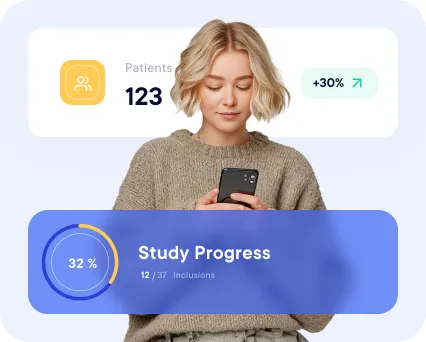L’eCOA, or Electronic Clinical Outcome Assessment, represents a revolution in clinical data collection. This technology radically transforms how researchers gather and analyze clinical trial results, offering unprecedented capture clinical outcome assessments directly compared with traditional paper methods.
eCOA refers to the use of electronic devices to directly capture clinical outcome assessments. Unlike traditional paper forms, this digital approach allows patients, investigators, and caregivers to record their observations through tablets, smartphones, or dedicated computers.
The different types of eCOA include:
- ePRO (electronic Patient Reported Outcomes): assessments reported directly by patients
- eClinRO (electronic Clinician Reported Outcomes): clinical observations entered by healthcare professionals
- eObsRO (electronic Observer Reported Outcomes): evaluations made by third party observers
- ePerfO (electronic Performance Outcomes): standardized performance measurements
This technology integrates seamlessly into the clinical trial ecosystem, creating a direct connection between participants and research teams.
What Are the Benefits of eCOA for Clinical Trials?
Adopting eCOA fundamentally transforms the quality and efficiency of clinical trials. Its main advantages include:
- Improved data quality: real time validation and fewer transcription errors
- Optimized user experience: a more intuitive interface for participants
- Instant access to information: investigators can review collected data immediately
- Faster research processes: immediate availability of data enabling continuous monitoring
- Increased responsiveness: quick protocol adjustments when needed, especially valuable in large scale studies where timing is critical
Economic benefits: although initial investment can be significant, long term savings result from reduced manual entry, data verification and error correction costs
eCOA ePRO vs Paper
Switching from paper to digital is far more than a simple technological upgrade. With paper forms, data collection timelines often extend over several weeks, involving complex processes of centralization, manual entry and verification. eCOA eliminates these intermediate stages by enabling direct and immediate data capture.
Transcription errors, a major issue in traditional methods, are virtually eliminated with eCOA. Integrated consistency checks instantly detect discrepancies, allowing participants to correct their responses in real time. This feature significantly enhances the reliability of collected data.
Additionally, eCOA improves participant follow up through automatic reminders and personalized notifications. This proactive approach boosts compliance and reduces missing data, a recurring challenge in traditional clinical trials.













.png)
.webp)
